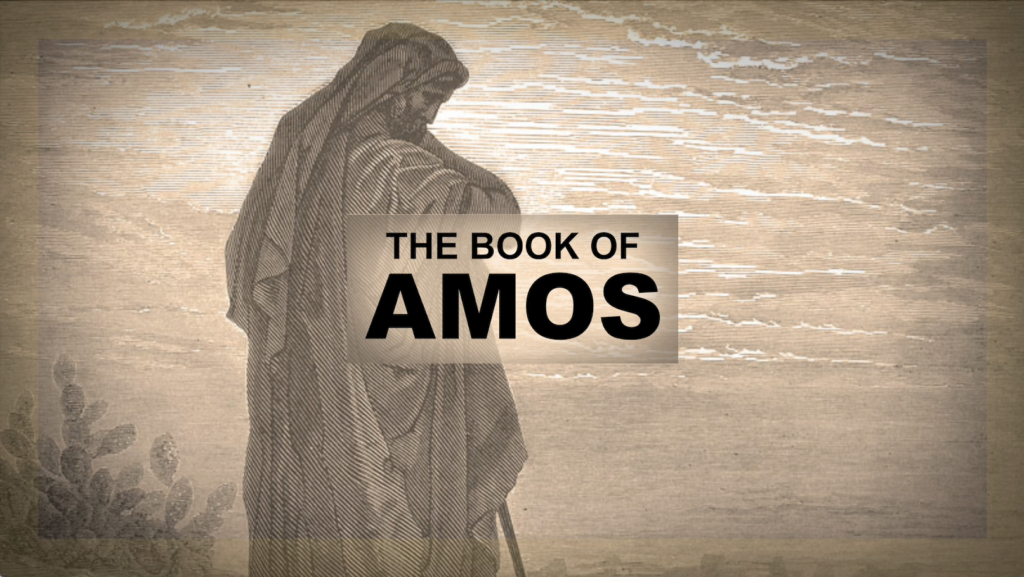
1:1 The words of Amos, who was among the shepherds of Tekoa, which he saw concerning Israel in the days of Uzziah king of Judah and in the days of Jeroboam the son of Joash, king of Israel, two years before the earthquake. 2 And he said: “The Lord roars from Zion and utters his voice from Jerusalem; the pastures of the shepherds mourn, and the top of Carmel withers.” 3 Thus says the Lord: “For three transgressions of Damascus, and for four, I will not revoke the punishment, because they have threshed Gilead with threshing sledges of iron. 4 So I will send a fire upon the house of Hazael, and it shall devour the strongholds of Ben-hadad. 5 I will break the gate-bar of Damascus, and cut off the inhabitants from the Valley of Aven, and him who holds the scepter from Beth-eden; and the people of Syria shall go into exile to Kir,” says the Lord. 6 Thus says the Lord: “For three transgressions of Gaza, and for four, I will not revoke the punishment, because they carried into exile a whole people to deliver them up to Edom. 7 So I will send a fire upon the wall of Gaza, and it shall devour her strongholds. 8 I will cut off the inhabitants from Ashdod, and him who holds the scepter from Ashkelon; I will turn my hand against Ekron, and the remnant of the Philistines shall perish,” says the Lord God. 9 Thus says the Lord: “For three transgressions of Tyre, and for four, I will not revoke the punishment, because they delivered up a whole people to Edom, and did not remember the covenant of brotherhood. 10 So I will send a fire upon the wall of Tyre, and it shall devour her strongholds.” 11 Thus says the Lord: “For three transgressions of Edom, and for four, I will not revoke the punishment, because he pursued his brother with the sword and cast off all pity, and his anger tore perpetually, and he kept his wrath forever. 12 So I will send a fire upon Teman, and it shall devour the strongholds of Bozrah.” 13 Thus says the Lord: “For three transgressions of the Ammonites, and for four, I will not revoke the punishment, because they have ripped open pregnant women in Gilead, that they might enlarge their border. 14 So I will kindle a fire in the wall of Rabbah, and it shall devour her strongholds, with shouting on the day of battle, with a tempest in the day of the whirlwind; 15 and their king shall go into exile, he and his princes together,” says the Lord.
2:1 Thus says the Lord: “For three transgressions of Moab, and for four, I will not revoke the punishment, because he burned to lime the bones of the king of Edom. 2 So I will send a fire upon Moab, and it shall devour the strongholds of Kerioth, and Moab shall die amid uproar, amid shouting and the sound of the trumpet; 3 I will cut off the ruler from its midst, and will kill all its princes with him,” says the Lord. 4 Thus says the Lord: “For three transgressions of Judah, and for four, I will not revoke the punishment, because they have rejected the law of the Lord, and have not kept his statutes, but their lies have led them astray, those after which their fathers walked. 5 So I will send a fire upon Judah, and it shall devour the strongholds of Jerusalem.” 6a–d Thus says the Lord: “For three transgressions of Israel, and for four, I will not revoke the punishment…
In March of 1964, two young singers, Paul Simon and Art Garfunkel, went into Columbia Studios and recorded a song. It was released on the duo’s first album on October 19, 1964. The album bombed, the band disbanded, and the two singers went their separate ways. The next year, however, the album’s producer, Tom Wilson, remixed the song, adding electric guitars and drums, and, in January of 1966, it hit number 1 on the Billboard Hot 100. That song was “The Sound of Silence.”
The closing stanza of the song is powerful and haunting and evocative. It stays with you. Here is how it goes:
And the people bowed and prayed
To the neon god they made
And the sign flashed its warning
In the words that it was forming
And the sign said, “The words of the prophets
Are written on the subway walls
And tenement halls”
And whispered in the sounds of silence[1]
I have always been fascinated by that line: “The words of the prophets are written on the subway halls.” Whatever else it means—and people, of course, debate the meaning of this song—it seems to mean that the great truths are not confined to ivory towers and academies. In fact, the words of the prophets are written on the subway walls and tenement halls. That is, the prophets are often common men and their truths are not hidden from the masses.
The prophet Amos fits the bill. He was no professional prophet! Verse 1 tells us:
1:1 The words of Amos, who was among the shepherds of Tekoa, which he saw concerning Israel in the days of Uzziah king of Judah and in the days of Jeroboam the son of Joash, king of Israel, two years before the earthquake.
So Amos was a shepherd in a small town called Tekoa. In fact, Amos, in chapter 7, will stress his humble origins even more:
14 Then Amos answered and said to Amaziah, “I was no prophet, nor a prophet’s son, but I was a herdsman and a dresser of sycamore figs. 15 But the Lord took me from following the flock, and the Lord said to me, ‘Go, prophesy to my people Israel.’ 16 Now therefore hear the word of the Lord.”
And, yet, God can do great things through a common man, a man of the fields, a man of subways. In verse 2 of Amos 1 we read:
2 And he said: “The Lord roars from Zion and utters his voice from Jerusalem; the pastures of the shepherds mourn, and the top of Carmel withers.”
Ah! See? It is not the social status of the prophet but rather the power of the prophet’s God that matters. We are reading this book these many years after its writing not because Amos was powerful but because the Lord roared like a lion through him, and so great was the voice of the Lord through Amos that “the pastures of the shepherds mourn, and the top of Carmel withers.” “Amos may be the prophet,” writes Mark Dever, “but he is only the prophet. The primary actor here is the Lord himself.”[2] Indeed!
Let us see what God says through the words of the prophet!
God pronounces judgment over the nations.
We begin with a litany of judgment against the nations. This will dominate Amos 1 and the beginning of Amos 2. In fact, what we find here are judgments against six pagan peoples. We are going to survey these and not dwell overly long on them, for, indeed, the book of Amos spends much more time on the judgment of God against His own people than it does on God’s judgment against these nations. And this is one of the major points of the book. In fact, this point is highlighted by the fact that the geographical charting of these pagan peoples seems to form a kind of bullseye in which God moves closer and closer to His own people before landing with withering judgment on Israel.
One more political/geographical fact needs to be kept in mind here. The people of God, at the time of the writing of Amos, were divided into two kingdoms: the northern kingdom of Israel and its capital of Samaria and the southern kingdom of Judah and its capital of Jerusalem. (You can read about the background of this split in 1 Kings 12.) Amos is from the southern kingdom of Judah and his prophecies will be focused most intensely on the northern kingdom of Israel.
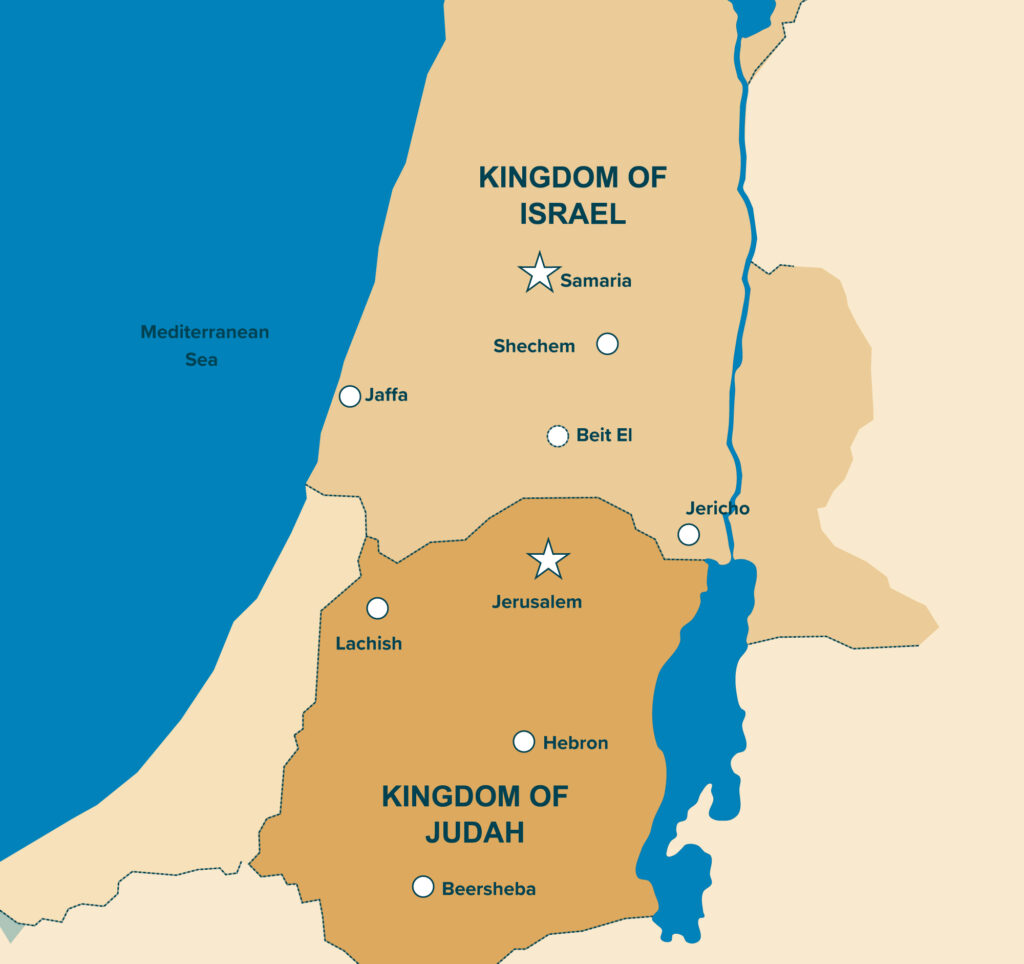
Damascus
Six pagan peoples are condemned. All of their crimes involve the mistreatment of people. All of these judgment oracles include the formula, “For three transgressions…and for four…,” a formula, Philip Johnston tells us, that “[a]ncient Semitic peoples” used “to convey ‘enough and more than enough.’”[3] The Lord speaks judgment over Damascus.
3 Thus says the Lord: “For three transgressions of Damascus, and for four, I will not revoke the punishment, because they have threshed Gilead with threshing sledges of iron. 4 So I will send a fire upon the house of Hazael, and it shall devour the strongholds of Ben-hadad. 5 I will break the gate-bar of Damascus, and cut off the inhabitants from the Valley of Aven, and him who holds the scepter from Beth-eden; and the people of Syria shall go into exile to Kir,” says the Lord.
A “threshing sledge” was a board with metal (in this case iron) or other sharp objects that would be drug over grain to separate it from straw.
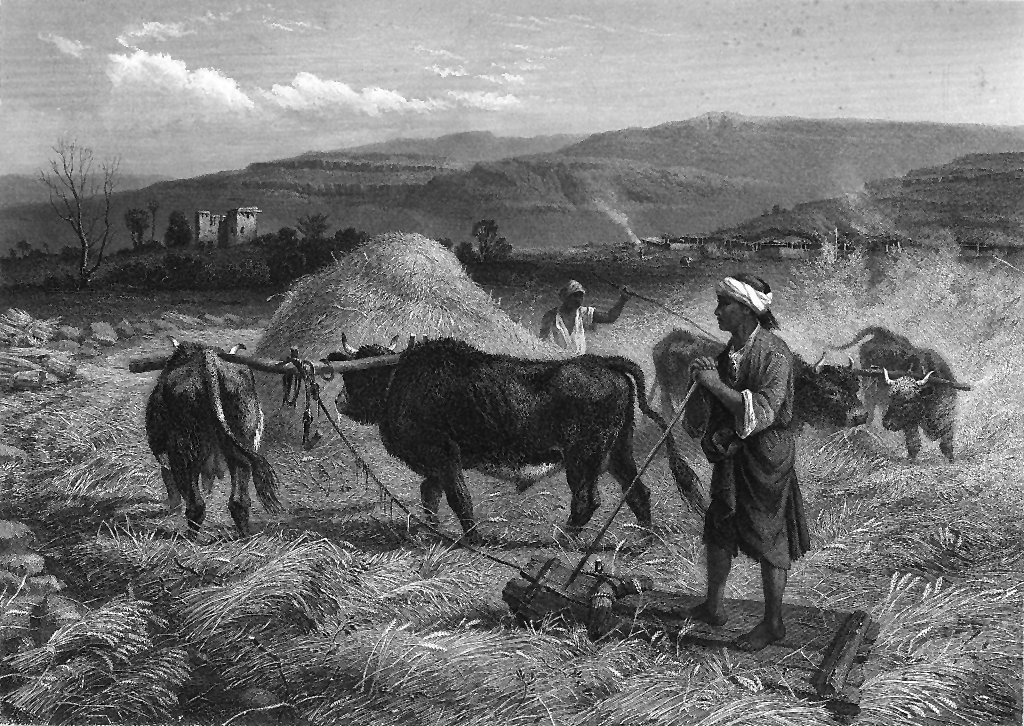
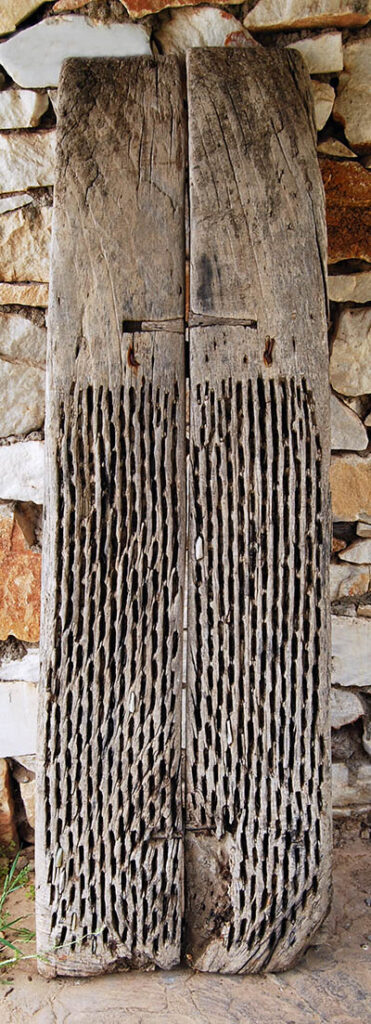
God is judging Damascus for their excessive cruelty in war, for, apparently, driving a threshing sledge over prisoners of war! His judgment will come in the form of fire, the destruction of the strongholds of Damascus, and the scattering and exile of the people.
Gaza
Now we turn to Gaza. These are the Philistines.
6 Thus says the Lord: “For three transgressions of Gaza, and for four, I will not revoke the punishment, because they carried into exile a whole people to deliver them up to Edom. 7 So I will send a fire upon the wall of Gaza, and it shall devour her strongholds. 8 I will cut off the inhabitants from Ashdod, and him who holds the scepter from Ashkelon; I will turn my hand against Ekron, and the remnant of the Philistines shall perish,” says the Lord God.
The Lord condemns Gaza for selling “a whole people” into slavery. Presumably, these are God’s people who were attacked, enslaved, and sold by the Philistines. The result is that God will smite the Philistines and destroy them.
Tyre
Next, we see God’s judgment upon Tyre.
9 Thus says the Lord: “For three transgressions of Tyre, and for four, I will not revoke the punishment, because they delivered up a whole people to Edom, and did not remember the covenant of brotherhood. 10 So I will send a fire upon the wall of Tyre, and it shall devour her strongholds.”
Like the Philistines, Tyre had sold “a whole people” into slavery. Furthermore, they violated “the covenant of brotherhood,” a treaty, in doing so. They too would undergo the judgment of divine fire.
Edom
Next, Edom, who in the previous two oracles of judgment was seen as participating in the slave trade, is condemned.
11 Thus says the Lord: “For three transgressions of Edom, and for four, I will not revoke the punishment, because he pursued his brother with the sword and cast off all pity, and his anger tore perpetually, and he kept his wrath forever. 12 So I will send a fire upon Teman, and it shall devour the strongholds of Bozrah.”
The Edomites attacked the people of Israel and Judah, were pitiless in their assault, and became a wrathful, violent people. For this, God would judge them and decimate their strongholds.
Ammonites
The judgment against Ammon is particularly jarring.
13 Thus says the Lord: “For three transgressions of the Ammonites, and for four, I will not revoke the punishment, because they have ripped open pregnant women in Gilead, that they might enlarge their border. 14 So I will kindle a fire in the wall of Rabbah, and it shall devour her strongholds, with shouting on the day of battle, with a tempest in the day of the whirlwind; 15 and their king shall go into exile, he and his princes together,” says the Lord.
This is, frankly, hard to read and even harder to fathom. The Ammonites committed demonic atrocities against pregnant women in their lust for land. The judgment contains many of the elements already mentioned, but then more: “shouting on the day of battle” and “a tempest in the day of the whirlwind.” Furthermore, we see the exiling of the royal family.
Moab
The last of the named pagan peoples in this oracle of judgment is Moab.
2:1 Thus says the Lord: “For three transgressions of Moab, and for four, I will not revoke the punishment, because he burned to lime the bones of the king of Edom. 2 So I will send a fire upon Moab, and it shall devour the strongholds of Kerioth, and Moab shall die amid uproar, amid shouting and the sound of the trumpet; 3 I will cut off the ruler from its midst, and will kill all its princes with him,” says the Lord.
Moab’s crimes against Edom were particularly intense and violent: “he burned to lime the bones of the king of Edom.” “The implication of burning the body ‘to lime’ may be, as the Targum explains, that the ash was then used for whitewash, an ultimate humiliation,” writes Philip Johnston.[4] Their judgment would likewise be severe, including the Lord killing “all its princes” alongside the “cut off…ruler.”
So, we see in Amos 1 and the beginning of Amos 2 the pronouncement of divine judgment over the pagan peoples of the earth. But we notice, as mentioned, that there is a kind of circling of an uncomfortable and increasingly-close target: God’s own people, particularly Israel.
God pronounces outrage over His people.
If God pronounces judgment over the pagan peoples of the earth, He exhibits outrage over the wickedness of His own people. We will be unpacking the details of Israel’s crimes in the weeks to come, but at this point it is enough to recognize that these circles of judgment eventually close in on Judah, then Israel.
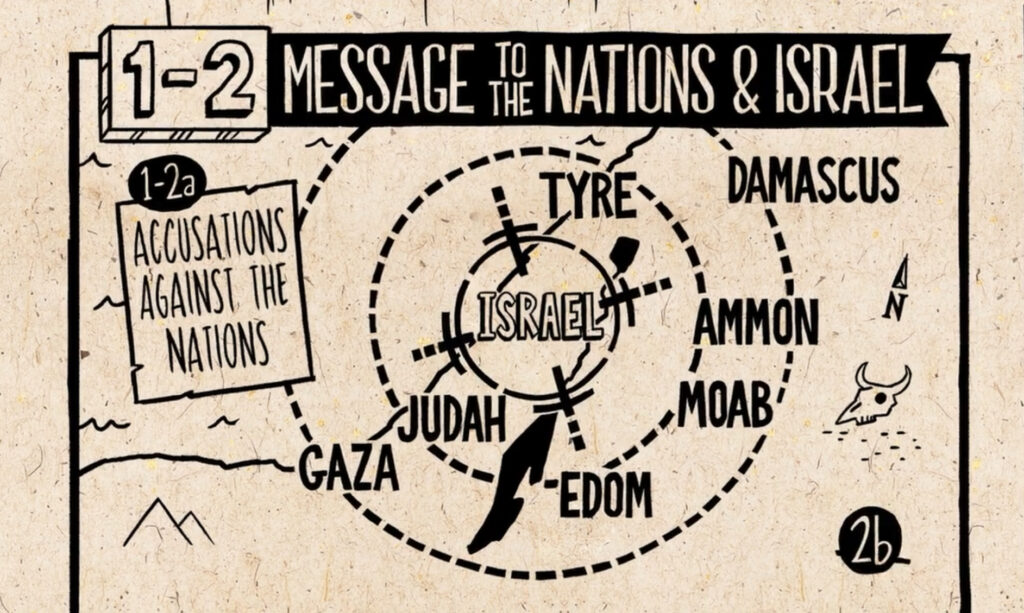
4 Thus says the Lord: “For three transgressions of Judah, and for four, I will not revoke the punishment, because they have rejected the law of the Lord, and have not kept his statutes, but their lies have led them astray, those after which their fathers walked. 5 So I will send a fire upon Judah, and it shall devour the strongholds of Jerusalem.” 6a–d Thus says the Lord: “For three transgressions of Israel, and for four, I will not revoke the punishment…
Let us notice something interesting: the crimes of the six preceding nations appear to involve violence and a violation of humanitarianism. It involved the nations’ treatment of people. But, out of the gate, “the transgressions of Judah” involve “reject[ing] the law of the Lord” and failing to keep God’s commands. What is more, they have abandoned the path of “their fathers,” the path of obedience to God.
Yes, as we will see, Israel also committed crimes against people, but we must take note of this: the nations preceding are not depicted as possessing the divine law. They are not, of course, thereby excused. God will judge them. We must remember that Paul says that all human beings have the basic contours of the law written on their hearts and even have some general notion that there is a God to whom we are accountable (see Romans 1 and 2). But the specificity of divine revelation as well as the covenantal relationship that had been established with God’s people raised the stakes immensely. This is why the pronouncements of judgment against the people of God in the book of Amos are so much longer than the brief pronouncements against the neighboring nations.
Simply put, the world is acting like the world, but God’s people know better!
It is fitting, then, that the bullseye eventually settles over Israel. We have no excuse!
Beware, Christian, your fixation on the fallenness of the world. Should you not rather first and foremost bemoan the fall of your own devotion to God? If you know Jesus Christ, are in a relationship with Him, have the Spirit of the living God within you, possess His word, have access to the body of Christ, the ordinances, Christian worship, and the communion of saints, ought you not follow the Lord more closely than the world which does not know Him?
Judgment begins at the household of God.
We have but one conclusion to reach when considering the beginning of Amos, and it is this: “Judgment begins at the household of God.” There is a type of Christianity that is fixated on chronicling the evils of the lost world, but is this not misguided if it is the church’s primary focus? Yes, we grieve over the lostness of the world, and, yes, we call sin sinwherever it is, but if we are grieved by the sinfulness of the world we should be shattered by the sinfulness of the church! The world, as far as I can tell, is living up to its stated goal of being lost! The world is amazingly consistent in its sinfulness.
But the church. The church! What of us? What of the people of God? The bullseye settles over us, no?
In 1 Peter 4, Peter writes something quite astonishing. He writes:
17 For it is time for judgment to begin at the household of God; and if it begins with us, what will be the outcome for those who do not obey the gospel of God? 18 And “If the righteous is scarcely saved, what will become of the ungodly and the sinner?”
Judgment begins at the household of God. We have the gospel! We have Christ! We have the indwelling Holy Spirit! Forget, for a moment, the world’s sins and think of your own. Do we not have a higher standard? Are we not called to more? Should we not get our own house in order?
I once had a church member in an earlier church complain to me about gay marriage. And I agree. The scriptures define marriage as between a man and woman or it is not marriage. Indeed, gay sexual behavior is sin. No question. And yet the church member complaining to me at that time was living with his girlfriend. Now I ask you, where should the greater outrage be? Should it be directed toward a lost world that may not even know the truth? Or should it be directed toward the house of God?
Christians today are shocked at the gender confusion of the trans movement. And we are right to be shocked. It is heartbreaking. The world needs to hear the biblical message of the creation of man and woman and understand all of its implications. But I have on two occasions had Christian men tell me that their wives must do their carnal duties whether or not they want to, opening the door essentially to sexual violence within marriage. Which is worse? That the lost world is confused and upside down on gender or that a self-proclaimed follower of Jesus Christ would suggest that simply by virtue of being a man he can violate his own wife? Is that not a distortion of gender in another direction? Is that not a shocking confusion as well? Is that not a violation of the created order as well? The difference? The church should know better!
I hear Christians talk about some of the wackiness of the environmental movement: the seeming paganistic worship of creation and near deification of animals. I agree. We should not worship creation. But I once pastored a church where a church member was on the news for gross neglect of a horse to the point of animal cruelty. Should a follower of the God who made heaven and earth not care for creation? We expect the lost world to mistreat creation in the direction of deification. But should followers of the Creator mistreat creation in the direction of neglect and abuse? Should we not know better?
I have heard Christians rail against abortion. I agree. I think abortion is a moral abomination. But in the first church I ever pastored a woman and her older son tied the younger son to a bed and poured Tabasco sauce in the child’s eyes to punish him. And I ask you, what is the bigger crime? A girl who was perhaps pushed into the moral evil of abortion by her father or husband or boyfriend? Or a self-proclaimed followers of Jesus torturing a child? It is not surprising that a lost world devalues life. It is shocking to the extreme that we would find abuse in the church!
I have yet to see a sin in the world that I have not seen in some grosser form in the church. And why is it grosser? Because the church knows better! Because the Holy Spirit of God is calling us moment by moment to Christ-likeness! Because we are the people of God!
My point is not that sin is not sin. In each case mentioned above, the sin should be condemned. But my point is that, biblically, the church’s first priority is to clean up its own house. This also does not mean we never mention the wickedness of the world. Of course, we must, as does scripture. But the emphasis in Amos and in scripture is on the household of God. The emphasis is on us!
Paul makes this exact point at the end of 1 Corinthians 5, a chapter in which he is expressing his shock at the church’s refusal to deal with immorality in its midst. The church knew and was tolerating immorality, and Paul tells them to respond to it with church discipline. But note how he ends:
9 I wrote to you in my letter not to associate with sexually immoral people— 10 not at all meaning the sexually immoral of this world, or the greedy and swindlers, or idolaters, since then you would need to go out of the world. 11 But now I am writing to you not to associate with anyone who bears the name of brother if he is guilty of sexual immorality or greed, or is an idolater, reviler, drunkard, or swindler—not even to eat with such a one. 12 For what have I to do with judging outsiders? Is it not those inside the church whom you are to judge? 13 God judges those outside. “Purge the evil person from among you.”
And there it is: judgment begins at the household of God. God will judge the world. You judge yourself. You cannot help but live in a fallen world and you would have to leave the world to get away from it, Paul writes. But, in the church, we are to be a holy people. We are to be a righteous people. We, the church, are to judge ourselves and bring our lives into alignment with the Lord.
You have perhaps heard the old story of the church that gathered for worship on a Sunday morning only to discover a casket in the front of the sanctuary. The pastor stood and, instead of a sermon, preached a funeral for the church. The church, he said, had died. It was dead. It had lost its life and vitality. At the conclusion, the pastor announced that he would open the casket and invite all present to come by, look inside, and see the dead church. And so they did. One by one they walked up front and looked into the casket. And there, in the bottom of the casket, the pastor had placed a large mirror. And so the church saw the dead church staring back up at them.
Brothers. Sisters. The point of Amos is that the thing that kills us more times than not is not the lost world, but the saved the church. We are the enemy we fear. And if we want to live, we need to get our own house in order, take stock of our own lives.
Amos is going to do something very dangerous. He is going to hold a mirror up to Israel…to us! And that is dangerous because those in rebellion do not want to see themselves as they are. I do not! But we all need to look into the mirror. And Amos is going to help us do that. And we are going to look closely at our lives and ask ourselves this question: “Am I walking with the God I profess to know? Am I a disciple of Jesus? Does my life match my creed?”
Have you rejected Jesus? Then receive Him in faith! Repent and believe!
Are you a follower of Jesus? Then follow Him! Stop playing games! Let him be Lord of your life!
[1] https://en.wikipedia.org/wiki/The_Sound_of_Silence
[2] Dever, Mark. The Message of the Old Testament. (Wheaton, IL: Crossway Books, 2006), p.725.
[3] Johnston, Philip S. “Amos.” Zondervan Illustrated Bible Backgrounds Commentary. Gen. ed. John H. Walton. Vol. 5 (Grand Rapids, MI: Zondervan, 2009), p.59.
[4] Johnston, Philip S., p.63.
